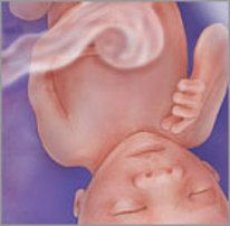Medical expert of the article
New publications
Pregnancy: 15 weeks
Last reviewed: 08.07.2025

All iLive content is medically reviewed or fact checked to ensure as much factual accuracy as possible.
We have strict sourcing guidelines and only link to reputable media sites, academic research institutions and, whenever possible, medically peer reviewed studies. Note that the numbers in parentheses ([1], [2], etc.) are clickable links to these studies.
If you feel that any of our content is inaccurate, out-of-date, or otherwise questionable, please select it and press Ctrl + Enter.

How the child grows:
The baby is now 10 cm and 70 grams. It is busy moving amniotic fluid through the nose and upper respiratory tract, which helps develop the primitive pulmonary alveoli in the lungs. The legs are getting longer, and the baby is starting to straighten and bend the limbs at the joints. Although its eyelids are still closed, the baby is already sensitive to light. If you were to shine a flashlight on it, it would probably move or turn away. At this stage, the baby's taste buds are already forming. And finally, the most important news: this week, you can find out the sex of your baby! (Don't be upset if it turns away and assumes a position in which the doctor cannot see the primary sexual characteristics, you will still have a chance to find out).
Important: Each baby's development is unique. Our information is designed to give you a general idea of fetal development.
Changes in the expectant mother
You've probably gained 5 pounds and are feeling fine. From time to time, you may experience nasal congestion, a common symptom among pregnant women caused by hormonal changes and increased blood flow to the mucous membranes. This condition is so common that it even has a name - "pregnancy rhinitis." Some pregnant women also notice nosebleeds as a result of the increased blood volume and dilation of blood vessels in the nose.
If needed, amniocentesis is performed between 15 and 18 weeks. This test can identify hundreds of genetic and chromosomal abnormalities.
Don't be surprised if you and your partner feel a little tense during these days. Many expecting couples worry and fret about their baby's health, but with less physical discomfort and a surge of energy, the second trimester is the most enjoyable for most women.
3 Questions About Baby's First Movements
Feeling your baby's first movements is one of the most amazing moments of pregnancy.
- When will I feel the baby move?
You can feel the baby's first movements between 16 and 22 weeks, although it starts moving at 7-8 weeks. Women who are not pregnant with their first child are able to notice the first movements much earlier, just like those who are extremely thin.
- What do these first baby movements look like?
Women describe the sensation as a fluttering of butterflies and a rocking sensation. You may think it's gas or stomach cramps when the first movements appear, but soon you'll start to feel them regularly. You'll most often feel these early movements while sitting or lying down.
- Is there any reason to worry?
Although your baby is already moving quite actively, his movements are not strong enough to feel them. Later, during the second trimester, his kicks will become more noticeable and regular. The moment you notice them, tell your doctor. Irregular kicks or their absence may signal a problem, and you will need to undergo an examination. In the third trimester, some experts recommend counting the baby's points throughout the day.
This week's activity: Talk to your child. This is a great way to start a connection with your child. If you feel strange about having a conversation, talk about what you are doing, read a book or magazine. Such conversations are one of the best methods for developing your child's language skills.


 [
[